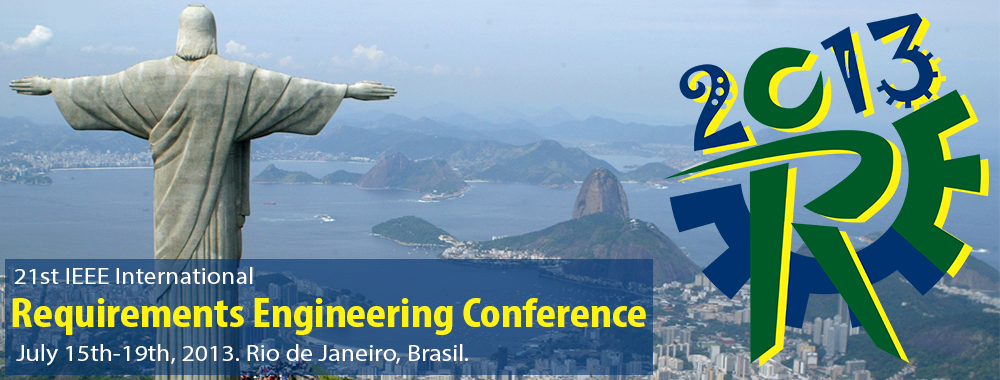News
- RE’13 presentation slides now available from the Downloads page.
Key Dates in 2013
- July 15: Doctoral Symposium
- July 15-16: Workshops & Tutorials
- July 17-19: Main Conference
Call for Industry Papers
Requirements engineering (RE) encompasses all the interdisciplinary activities involved in determining, documenting, and maintaining an agreed set of requirements for a system, and for tracing these through to implementation. A specific concern is the development of practical techniques, methods, and tools to support these activities. The 21st IEEE International Requirements Engineering Conference (RE’13) invites Industry Paper submissions that address any facet of the requirements engineering process, from elicitation to validation, from formal to informal, from large to small, from traditional to agile, and across people-centric, business-centric, and system-centric viewpoints.
Topics of interest include, but are not limited to:
- Requirements engineering process definition, measurement, and improvement
- Stakeholder identification, engagement, and management
- Requirements elicitation, analysis, documentation, validation, and verification
- Requirements negotiation, prioritization, and domain ontology construction
- Requirements specification languages and model-driven approaches
- Modeling of requirements, goals, and wider system concerns
- Requirements management and traceability
- Evolution of requirements over time, product families, and variability
- Requirements across the entire system lifecycle
- Domain-specific problems, experiences, and solutions
- Requirements in market-driven, service-oriented, and product line environments
- Requirements for highly complex systems on a global scale
- Requirements for large-scale procurement contracts
- Social, cultural, global, personal, and cognitive factors in requirements engineering
- Industry and research collaboration, learning from practice, and technology transfer
- Requirements engineering education and training
- Tool support for requirements engineering
Industry Paper Categories
Industry papers are divided into 3 sub-categories:
i. Industry Practice Papers report on the application of requirements engineering techniques, methods, and tools on concrete projects within real-world settings. These papers tell a story and relate experiences of success or failure, experiences from which both researchers and practitioners can draw valuable lessons. The focus is on what was undertaken, in what context, and on the lessons learned.
- Evaluation criteria: The practice must be clearly described and its context must be given. The paper must be easy to follow, allowing practitioners to draw conclusions for their own practice. The lessons learned should be justified by quantitative or qualitative evidence. Industry practice papers will be evaluated for their contribution to a body of knowledge for requirements engineering professional practice, along with the significance of the insights presented.
- Length: Industry practice papers must not exceed 6 pages (including references).
ii. Industry Challenge Papers pose problems or challenges encountered in requirements engineering practice in particular domains, projects, or settings; problems and challenges that are in need of attention by researchers, practitioners, and tool vendors.
- Evaluation criteria: The challenge and the problem context must be clearly described. Submissions must indicate the applicability of the challenge; is it a generic issue or something applicable only in certain contexts? For the latter, the scope of the challenge should be clearly defined. The applicability must be justified by a sound reasoned argument, ideally supported by some evidence. Industry challenge papers must explicitly set out the research that the authors believe is required to address the stated challenge.
- Length: Industry challenge papers must not exceed 6 pages (including references).
iii. Applied Research Papers report on research pilot studies undertaken within an industry setting. These papers describe preliminary efforts to transfer new research results into industry practice, conducted by the practitioners themselves, academic partners, or a mixed team.
- Evaluation criteria: The applicability of the research under investigation must be well motivated and the conduct of the pilot study described thoroughly. The findings should be articulated clearly, along with any recommendations or proposed future steps to adopt the research more widely (or to cancel the effort). Other practitioners should be able to follow easily and to replicate the pilot study if appropriate to their context.
- Length: Applied research papers must not exceed 6 pages (including references).
Submission Instructions
Papers must describe original work that has not been submitted to or presented at other forums. Submissions must be written in English and formatted according to the IEEE formatting guidelines provided here. Papers that exceed the length specification of their submission category or are not formatted correctly will be rejected without review. All accepted papers will be published as IEEE CS Press Conference Proceedings. Acceptance of a paper implies that one of the authors registers to the conference to present the submission; failure to do so by the early registration date will result in the paper being withdrawn from the conference proceedings.
Direct link to the Industry Paper submission page
Important Dates
- Abstracts: January 21st, 2013
- Full paper submissions: January 28th, 2013
- Notification: March 22nd, 2013
- Camera-ready: April 15th, 2013
*All deadlines are 23:59 Pago Pago, American Samoa time
Need Help?
If you have never previously published at a major international conference and would like some help with planning your Industry Paper submission, please consider the guidance and support offered by the RE’13 Industry Paper Mentor, Ian Alexander.
Contact
If the paper you have planned does not fit neatly into any of the above categories, or you have any other question relating to your Industry Paper submission, please contact the Industry Chair for advice.



